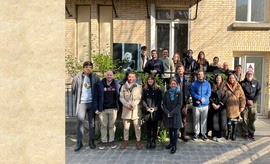Transcription/Replication Conflicts in Tumorigenesis and Their Potential Role as Novel Therapeutic Targets in Multiple Myeloma
Plasma cells (PCs) have an essential role in humoral immune response by secretion of antibodies, and represent the final stage of B lymphocytes differentiation. During this differentiation, the pre-plasmablastic stage is characterized by highly proliferative cells that start to secrete immunoglobulins (Igs). Thus, replication and transcription must be tightly regulated in these cells to avoid transcription/replication conflicts (TRCs), which could increase replication stress and lead to genomic instability. In this review, we analyzed expression of genes involved in TRCs resolution during B to PC differentiation and identified 41 genes significantly overexpressed in the pre-plasmablastic stage. This illustrates the importance of mechanisms required for adequate processing of TRCs during PCs differentiation. Furthermore, we identified that several of these factors were also found overexpressed in purified PCs from patients with multiple myeloma (MM) compared to normal PCs. Malignant PCs produce high levels of Igs concomitantly with cell cycle deregulation. Therefore, increasing the TRCs occurring in MM cells could represent a potent therapeutic strategy for MM patients. Here, we describe the potential roles of TRCs resolution factors in myelomagenesis and discuss the therapeutic interest of targeting the TRCs resolution machinery in MM.


